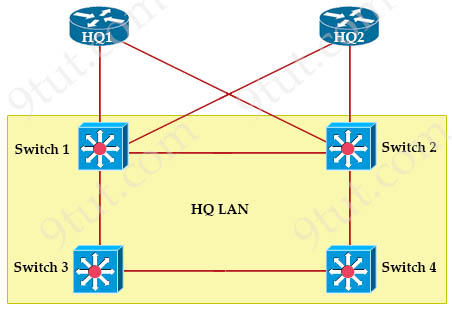STP & VTP Questions
Note: If you are not sure about STP or VTP, please read our Spanning Tree Protocol STP Tutorial, Rapid Spanning Tree Protocol RSTP Tutorial, STP Root Port Election Tutorial and VLAN Trunking Protocol VTP Tutorial.
Question 1
Question 2
Explanation
The purpose of Port Fast is to minimize the time interfaces must wait for spanning-tree to converge, it is effective only when used on interfaces connected to end stations.
Question 3
Explanation
Enabling the PortFast feature causes a switch or a trunk port to enter the STP forwarding-state immediately or upon a linkup event, thus bypassing the listening and learning states.
Note: To enable portfast on a trunk port you need the trunk keyword “spanning-tree portfast trunk“
Question 4
Explanation
The VTP mode of SW2 is transparent so it only forwards the VTP updates it receives to its trunk links without processing them.
Question 5
Explanation
This bridge is not the root bridge because it does not have the statement “This bridge is the root”. When the local switch is not the root bridge, the port it shows would be the root port to the root bridge. Therefore in this case FastEthernet2/1 is the root port that is connected to the root bridge.
Question 6
Explanation
As this question did not state about bridge priority so we can assume all of them are using the default priority. Therefore the switch with lowest MAC address wins the election.
Question 7
Question 8
Question 9
Question 10
Explanation
The keyword here is “always” so we should set the priority to the lowest value which is 0. If we use the “primary root” keyword then our switch is only set to the lower value compared to other switches. And new switch added in the future can be set to lower value than our switch to take over the root role.
Question 11
Question 12
Refer to the exhibit.

| Switch1: 0C.E0.38.57.24.22 Switch2: 0C.0E.15.22.1A.61 Switch3: 0C.0E.15.1D.3C.9A Switch4: 0C.E0.19.A1.4D.16 |
After the election process what is the root bridge in the HQ LAN?
A. Switch 1
B. Switch 2
C. Switch 3
D. Switch 4
Answer: C
Question 13



@9tut How to calculate lower mac id on question no. 12 switch 2 mac add is 22.1A.61 AND SW3 MAC Add is 1D.3C.9A. what i calculate is
22:1D (1D in binary 0001 1101=29)
@tili: You don’t need to convert to binary to compare. Just compare each hex number from left to right. In this case just compare 2 > 1 (in 22 and 1D) so SW2 MAC is higher than SW3 MAC.
the questions are hidden on my web why please???
@9tut
For q10 & 13 shouldn’t be if I select the vlan as root primary that means it is lowest cost and priority as well, so shouldn’t be the correct answer spanning-tree vlan 200 root primary
@Anonymous: The keyword here is “always” so we should set the priority to the lowest value which is 0. If we use the “primary root” keyword then our switch is only set to the lower value compared to other switches. And new switch added in the future can be set to lower value than our switch to take over the root role.